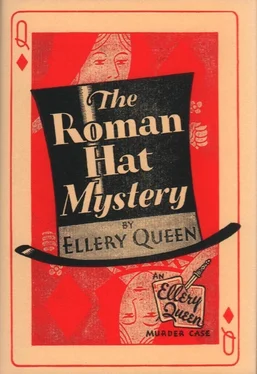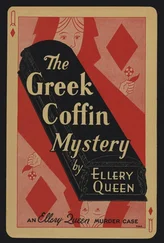“I am,” said Queen gravely.
“Then I want you to know,” burst out the newcomer “—here, you, let go of my arm, do you hear? — I want you to know, sir...”
“Detach yourself from the gentleman’s arm, officer,” said the Inspector, with deepening gravity.
“... that I consider this entire affair the most vicious outrage! I have been sitting here with my wife and daughter since the interruption to the play for almost an hour, and your officers refuse to allow us even to stand up. It’s a damnable outrage, sir! Do you think you can keep this entire audience waiting at your leisure? I’ve been watching you — don’t think I haven’t. You’ve been dawdling around while we sat and suffered. I want you to know, sir — I want you to know! — that unless you permit my party to leave at once, I shall get in touch with my very good friend District Attorney Sampson and lodge a personal complaint against you!”
Inspector Queen gazed distastefully into the empurpled face of the stout little man. He sighed and said with a note of sternness, “My dear man, has it occurred to you that at this moment, while you stand beefing about a little thing like being detained an hour or so, a person who has committed murder may be in this very audience — perhaps sitting next to your wife and daughter? He is just as anxious as you to get away. If you wish to make a complaint to the District Attorney, your very good friend, you may do so after you leave this theatre. Meanwhile, I’ll trouble you to return to your seat and be patient until you are permitted to go... I hope I make myself clear.”
A titter arose from some spectators nearby, who seemed to be enjoying the little man’s discomfiture. He flounced away, with the policeman stolidly following. The Inspector, muttering “Jackass!” turned to Velie.
“Take Panzer with you to the box office and see if you can find complete tickets for these numbers.” He bent over the last row and the row before it, scribbling the numbers LL30 Left, LL28 Left, LL26 Left, KK32 Left, KK30 Left, KK28 left, and KK26 Left on the back of an old envelope. He handed the memorandum to Velie, who went away.
Ellery, who had been leaning idly against the rear wall of the last row, watching his father, the audience, and occasionally restudying the geography of the theatre, murmured in the Inspector’s ear: “I was just reflecting on the unusual fact that with such a popular bit of dramatic trash as ‘Gunplay,’ seven seats in the direct vicinity of the murdered man’s seat should remain empty during the performance.”
“When did you begin to wonder, my son?” said Queen, and while Ellery absently tapped the floor with his stick, barked, “Piggott!”
The detective stepped forward.
“Get the usherette who was on this aisle and the outside doorman — that middle-aged fellow on the sidewalk — and bring ’em here.”
As Piggott walked off, a disheveled young man appeared by Queen’s side, wiping his face with a handkerchief.
“Well, Flint?” asked Queen instantly.
“I’ve been over this floor like a scrubwoman, Inspector. If you’re looking for a hat in this section of the theatre, it’s mighty well hidden.”
“All right, Flint, stand by.”
The detective trudged off. Ellery said slowly, “Didn’t really think your young Diogenes would find the tophat, did you, dad?”
The Inspector grunted. He walked down the aisle and proceeded to lean over person after person, questioning each in low tones. All heads turned in his direction as he went from row to row, interrogating the occupants of the two aisle seats successively. As he walked back in Ellery’s direction, his face expressionless, the policeman whom he had sent out with the piece of string saluted him.
“What size, officer?” asked the Inspector.
“The clerk in the hat store said it was exactly 7⅛,” answered the bluecoat. Inspector Queen nodded, dismissing him.
Velie strode up, with Panzer trailing worriedly behind. Ellery leaned forward with an air of keen absorption to catch Velie’s words. Queen grew tense, the light of a great interest on his face.
“Well, Thomas,” he said, “what did you find in the box office?”
“Just this, Inspector,” reported Velie unemotionally. “The seven tickets for which you gave me the numbers are not in the ticket rack. They were sold from the box office window, what date Mr. Panzer has no way of knowing.”
“The tickets might have been turned over to an agency, you know, Velie,” remarked Ellery.
“I verified that, Mr. Queen,” answered Velie. “Those tickets were not assigned to any agency. There are definite records to prove it.”
Inspector Queen stood very still, his gray eyes gleaming. Then he said, “In other words, gentlemen, it would seem that at a drama which has been playing to capacity business ever since its opening, seven tickets in a group were bought — and then the purchasers conveniently forgot to attend the performance!”
3
In Which A ‘Parson’ Came To Grief
There was a silence as the four men regarded each other with a dawning conviction. Panzer shuffled his feet and coughed nervously; Velie’s face was a study in concentrated thought; Ellery stepped backward and fell into a rapt contemplation of his father’s gray-and-blue necktie.
Inspector Queen stood biting his mustache. He shook his shoulders suddenly and turned on Velie.
“Thomas, I’m going to give you a dirty job,” he said. “I want you to marshal a half-dozen or so of the uniformed men and set ’em to a personal examination of every soul in this place. All they have to do is get the name and address of each person in the audience. It’s quite a job, and it will take time, but I’m afraid it’s absolutely necessary. By the way, Thomas, in your scouting around, did you question any of the ushers who take care of the balcony?”
“I got hold of the very man to give me information,” said Velie. “He’s the lad who stands at the foot of the stairs in the orchestra, directing holders of balcony tickets to the upper floor. Chap by the name of Miller.”
“A very conscientious boy,” interposed Panzer, rubbing his hands.
“Miller is ready to swear that not a person in this theatre either went upstairs from the orchestra or came downstairs from the moment the curtain went up on the second act.”
“That sort of cuts down your work, Thomas,” remarked the Inspector, who had been listening intently. “Have your men go through the orchestra boxes and orchestra only. Remember I want the name and address of every person here — every single one. And Thomas—”
“Yes, Inspector?” said Velie, turning back.
“While they’re at it, have ’em ask these people to show the ticket stubs belonging to the seats in which they are sitting. Every case of loss of stub should be noted beside the name of the loser; and in cases — it is a bare possibility — where a person holds a stub which does not agree with the seat number of the chair in which he’s sitting, a notation is also to be made. Think you can get all that done, my boy?”
“Sure thing!” Velie grunted as he strode away.
The Inspector smoothed his gray mustache and took a pinch of snuff, inhaling deeply.
“Ellery,” he said, “there’s something worrying you. Out with it, son!”
“Eh?” Ellery started, blinking his eyes. He removed his pince-nez, and said slowly, “My very revered father, I am beginning to think that — Well, there’s little peace in this world for a quiet book-loving man.” He sat down on the arm of the dead man’s seat, his eyes troubled. Suddenly he smiled. “Take care that you don’t repeat the unfortunate error of that ancient butcher who, with his twoscore apprentices, sought high and low for his most treasured knife when all the time it reposed quietly in his mouth.”
Читать дальше












